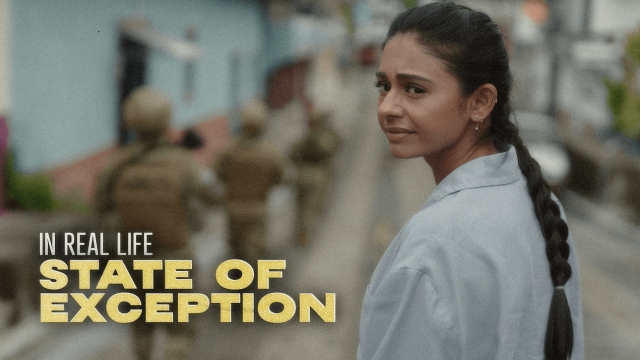In the span of four years, El Salvador has gone from being the murder capital of the world to the safest country in the western hemisphere.
The result: El Salvador has imprisoned 70,000 people it says are “associated with gangs” within two years. But with so many arrests, how can the country ensure that everyone they catch is a criminal?
“Everything has its good and its bad," says Pedro Rojas, a community organizer. Pedro has seen first-hand the transformation of his neighborhood, Las Cañas, from a sharply divided gang warzone to a bustling hub of local business and soccer matches.
But to achieve peace in Las Cañas, Rojas says the Salvadoran National Police detained over 300 people from the neighborhood. “Between good and bad, because also remember that the 'State of Exception' doesn’t only take bad people. Rojas says. “But there are raids where they take people away who have done nothing.”
Scripps News spoke with a member of the Salvadoran National Police who claims that, to boost the number of arrests in the country, commanding officers instituted arrest quotas for certain precincts. Scripps News has viewed documents that appear to show arrest quotas within the precinct of San Salvador. The same police officer claims that he has detained innocent people in El Salvador under the “State of Exception.” “I feel guilty because these people could have died in prison because of an arrest that didn’t have to happen,” says the officer. El Salvador’s National Civil Police did not return a request for comment.
In a country that is notorious for the imprisonment of government leakers, it is difficult to gather information from within the Salvadoran justice system, but Scripps News obtained documents detailing the imprisonment of a 14-year-old US citizen. The minor, who was in El Salvador visiting relatives, was detained under the charge of the “Illegal Association” and held in a juvenile detention center. During his detention, he was severely beaten and drowned until the point of unconsciousness.
After being treated for his injuries, the boy was released by a judge, who stated that the detention was “an illegal deprivation of his liberty." Anonymous sources and documents included in this documentary were verified through photos, police records, and first-hand interviews.
SEE MORE: In Real Life: Mining the Deep Sea
Reporting has shown that over 6,000 innocent individuals have been released from Salvadoran prisons during the “State of Exception.” Scripps News spoke with the Vice President of El Salvador about how the country can justify the wrongful imprisonment of innocent civilians. “Less than 10% of mistakes and more than 90% of things well done. So, you have to continue.
We are doing something really good, so we have to continue doing the really good and try to avoid the mistake,” says Vice President Félix Ulloa.
When pressed on the release of further innocent civilians, the vice president claims that they have already released all the innocent civilians. “What are those innocent people? I am telling you, the innocent people have been released."
Despite the vice president’s claims, human rights groups in El Salvador say there may be as many as 14,000 individuals still imprisoned with no connection to the gangs.
The impacts of these mass arrests ripple through families not only in El Salvador but also in the country with the second-most Salvadorans, the United States. In both countries, Scripps News reached out to many of these families; most chose not to speak up out of fear of retaliation by the Salvadoran government.
“It’s very hard for me. I cry all night long. I dream about them—that they are starving, that they are feeling cold—have they been beaten?” says Consuelo Gomes, a U.S. citizen who runs MOVIR, or the Movement of the Victims of the “State of Exception.”
SEE MORE: Here's where to find Scripps News documentaries and investigations
Consuelo’s two sons were both arrested in El Salvador and impacted by the “State of Exception.” She has little detail as to where they are or what crimes they are accused of. She claims that her two children have never been associated with gangs. “So that's what we parents want to know—that we have innocent children in detention. It's the fight we have. We fight by asking them to show us evidence. Show us evidence or release them now.”
In Aug. 2023, U.S. officials, including U.S. Secretary of State Antony Blinken, met with Salvadoran diplomats and publicly applauded the country’s commitment to human rights. But when we asked U.S. State Department officials if they were aware of U.S. citizens that have been arrested with little or no due process in El Salvador, they provided the following response:
“The Department of State has no higher priority than the safety and security of U.S. citizens overseas. We are aware of U.S. citizens detained in El Salvador. We take our role in assisting U.S. citizens abroad seriously and are engaged with the Government of El Salvador directly on this issue. The state of exception must be an exception.
The United States wants to work closely with El Salvador to support a sustainable path forward to these enduring challenges that affect the lives of every Salvadoran.”
The ideas behind the “State of Exception” seem to be gaining traction. Neighboring governments in Honduras, Guatemala, and the Dominican Republic have all explored implementing their own form of a “State of Exception” to quell gang violence in their own countries.
This new chapter in the age-old struggle between security and personal freedom might have started in El Salvador, but its impacts are being felt across the region and the world.
Trending stories at Scrippsnews.com




